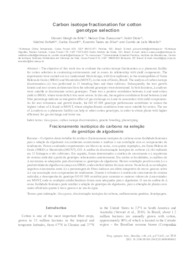Carbon isotope fractionation for cotton genotype selection.
Carbon isotope fractionation for cotton genotype selection.
Author(s): BRITO, G. G. de; SUASSUNA, N. D.; DIOLA, V.; SOFIATTI, V.; DUCATTI, C.; SILVA, E. T. da; MORELLO, C. de L.
Summary: The objective of this work was to evaluate the carbon isotope fractionation as a phenomic facility for cotton selection in contrasting environments and to assess its relationship with yield components. The experiments were carried out in a randomized block design, with four replicates, in the municipalities of Santa Helena de Goiás (SHGO) and Montividiu (MONT), in the state of Goiás, Brazil. The analysis of carbon isotope discrimination (Δ) was performed in 15 breeding lines and three cultivars. Subsequently, the root growth kinetic and root system architecture from the selected genotypes were determined. In both locations, Δ analyses were suitable to discriminate cotton genotypes. There was a positive correlation between Δ and seed‑cotton yield in SHGO, where water deficit was more severe. In this site, the negative correlations found between Δ and fiber percentage indicate an integrative effect of gas exchange on Δ and its association with yield components. As for root robustness and growth kinetic, the GO 05 809 genotype performance contributes to sustain the highest values of Δ found in MONT, where edaphoclimatic conditions were more suitable for cotton. The use of Δ analysis as a phenomic facility can help to select cotton genotypes, in order to obtain plants with higher efficiency for gas exchange and water use.
Publication year: 2014
Types of publication: Journal article
Observation
Some of Embrapa's publications are published as ePub files. To read them, use or download one of the following free software options to your computer or mobile device. Android: Google Play Books; IOS: iBooks; Windows and Linux: Calibre.
Access other publications
Access the Agricultural Research Database (BDPA) to consult Embrapa's full library collection and records.
Visit Embrapa Bookstore to purchase books and other publications sold by Embrapa.

